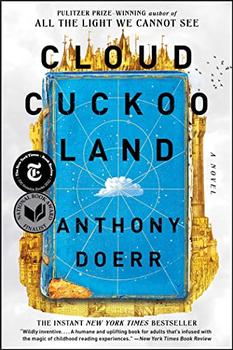Summary | Excerpt | Reading Guide | Reviews | Beyond the book | Read-Alikes | Genres & Themes | Author Bio

Olivia Wolfgang-Smith's novel Glassworks is an incandescent debut that follows the lives of four people on the brink of metamorphosis. We first meet Agnes in 1910, a wealthy young woman eager to commission glass teaching models of plants for her university's biology department (see Beyond the Book). She hires Czech artist Ignace for the job, luring him away from his home country in spite of the university board's reluctance, with consequences neither character can anticipate. The plot then skips to 1938, shifting to the story of Agnes' son, 18-year-old Edward, as he struggles to find his place in the world. Another jump moves the action forward to 1986 where 47-year-old Novak finds herself taking care of her elderly, disabled father, while simultaneously trying to give her own life shape and meaning. And lastly, we meet Flip, who in 2015 can't seem to find love and acceptance even within her own family.
The book reads like four interconnected, sequential novellas. With each new section, the perspective changes completely and the voice that was the focus of the preceding chapter is silenced. The connecting thread between them is glass, with each character's life revolving around the medium in some way (e.g., Edward seeks to work in the stained-glass industry while Novak washes the windows of New York's skyscrapers). But glass also serves as a metaphor for each of their lives; it's a material that can be shaped into objects of great beauty and resiliency, yet it's fragile—something that can be shattered by ill-treatment. It can be clear or opaque, cool or warm, simple or complex. We see all its many attributes reflected through the lives of Agnes, Edward, Novak and Flip.
The author brilliantly explores complex themes through her characters, in particular discussing questions of family—who is our family? What do we owe them, and what do they owe us? Glassworks shows how little adult children understand about their parents. At one point Edward sits in Boston's Carter Plaza wondering if his parents ever saw it, not knowing his mother's family commissioned it. He thinks to himself, "They hadn't even had to try…If they had, they'd understand how it felt to struggle, or to worry about impressing the right people." Readers know from the previous section that nothing could be farther from the truth, and this gulf between parent and child feels at once familiar and heartbreaking. The book also touches on ideas of hardship and resiliency. Discussion of topics such as spousal abuse, mental health, alcoholism and the AIDS crisis question how we react to adversity—will we overcome it, or be buried by it?
In addition to a marvelously multi-layered plot, Wolfgang-Smith's characters are drawn superbly, and her prose is as luminous as the glass about which she writes. There are resonances scattered throughout, echoes readers intuit but of which the characters themselves are oblivious (Novak loves a window she's working on because it's "cloudy with life like a turbid sea" while Edward's favorite stained glass evokes the waters around Noah's ark). This novel is as close to perfect as any I can recall; I'm astonished this is the author's debut work.
My only caveat about the book is that each section ends rather abruptly, generally in the midst of a crisis. One character may have died at the end of their chapter, for example, and readers don't know that person's fate until a casual mention many pages later. I have never encountered a novel with so many unresolved plotlines. Normally that would be a deal-breaker for me (I confess I like my plots wrapped up neatly). However, in the context of this novel the technique really works, emphasizing the disconnect between generations. It serves to highlight what a remarkable author Wolfgang-Smith is; the book really knocked my socks off.
In short, I can't recommend Glassworks highly enough. Readers looking for a well-written work of literary fiction – particularly those hoping for something a little different – will definitely want to put this one on their list. It would also make an excellent choice for book groups.
![]() This review was originally published in The BookBrowse Review in June 2023, and has been updated for the
February 2025 edition.
Click here to go to this issue.
This review was originally published in The BookBrowse Review in June 2023, and has been updated for the
February 2025 edition.
Click here to go to this issue.

If you liked Glassworks, try these:

by Elif Shafak
Published 2025
In the ancient city of Nineveh, on the bank of the River Tigris, King Ashurbanipal of Mesopotamia, erudite but ruthless, built a great library that would crumble with the end of his reign.

by Anthony Doerr
Published 2022
From the Pulitzer Prize-winning author of All the Light We Cannot See, perhaps the most bestselling and beloved literary fiction of our time, comes a triumph of imagination and compassion, a soaring novel about children on the cusp of adulthood in a broken world, who find resilience, hope, and story.
Your guide toexceptional books
BookBrowse seeks out and recommends the best in contemporary fiction and nonfiction—books that not only engage and entertain but also deepen our understanding of ourselves and the world around us.